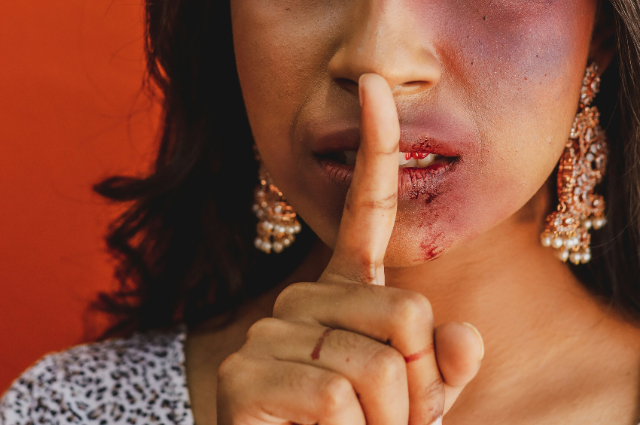
Photo by Kogulanath Ayappan on Unsplash
This horrible event, happening in a place that is supposed to be sacred, shows us something very disturbing: how predators can operate in a society that lets them go unchecked.
The fact that 23 men could hurt one woman for six days without any of them stopping or asking for help is terrifying. These men didn’t just make a mistake; they chose to act with complete cruelty. They didn’t care about the victim's pain or dignity.
What does it say about a society when such actions are allowed to happen? How is it that no one, not even one of these men, thought to stop and think about what they were doing? How did they feel no shame or guilt? This is not just a failure of the law, it's a failure of humanity.
This young woman, just 19 years old, went through an unimaginable ordeal. She didn’t just lose her safety; she lost her peace of mind. After returning home, she felt too scared to speak up, and it took several days for her family to file a complaint. This tells us that, for many victims, the fear of being ignored or blamed keeps them silent.
This case shows how deeply we need to change things. It’s not enough to just talk about justice after something happens; we need to create a society where these things don’t happen in the first place. We need to build an environment where people stand up when they see something wrong, where helping each other is a priority, and where the safety of everyone, especially women, is guaranteed.
The Failure of Law
In India, the journey to justice for rape survivors is fraught with challenges, and the statistics paint a concerning picture. According to a 2024 report by the Ministry of Statistics, the national conviction rate for rape cases that went to trial stands at just 2.56%. This means that out of every 100 rape cases that proceed to court, fewer than three result in a conviction.
Several factors contribute to this low conviction rate:
- Delays in Trials: Many cases take years to come to trial; during this time, evidence can be lost, and witnesses may become uncooperative or forget crucial details.
- Insufficient Evidence: Poor investigation practices often lead to a lack of concrete evidence, making it difficult to secure convictions.
- Witness Intimidation: Victims and witnesses may face threats or pressure, leading them to retract statements or refuse to testify.
- Social Stigma: The societal shame associated with rape can discourage victims from reporting the crime or pursuing legal action.
And when people take justice into their own hands, what do they get? Punishment for fighting back? We wish there were real-life Singams from the movies. But sometimes, our brave women become the only defenders of justice.
Women Fight Back:
In 2012, a woman in Delhi was reportedly attacked and raped by a man. During the assault, she managed to overpower him and fatally injure him in self-defense. She later surrendered to the police, and the case highlighted issues of women's safety and the right to self-defense.
In 2019, a 30-year-old woman from Swarachi village in West Bengal reported that her neighbor, Tapan Shaw, attempted to rape her and strangled her 6-year-old daughter. In self-defense, she struck Shaw with a rod, resulting in his death. She then buried his body in a banana grove and later surrendered to the police. Authorities initiated a murder investigation, suspecting a property dispute and possible involvement of her husband.
These cases show the complicated mix of justice, trauma, and legal consequences. While some women take drastic actions out of desperation, others face serious consequences. Each case highlights how broken the system is - and how badly we need reform.
A question remains: if someone fights for justice, why are they punished? But those who commit the crime walk free? Is that justice?
A Call to Action:
We can no longer afford to be silent spectators.
When a girl is raped, it is not just her body that is violated—it's the very fabric of our society that is torn. If we continue to ignore, brush aside, or fear speaking out, we become part of the problem. The system may be slow, but change starts with pressure. And that pressure begins with us.
Believe survivors. Stand with them. Raise your voice even when it shakes.
Demand faster trials. Push for stronger, survivor-friendly laws. Question the silence of those in power. And above all, teach the next generation what respect, empathy, and consent mean.
Every time we choose to care, speak, or act, we build a world where justice is not just a possibility but a promise.
Because if we don’t fight for change now, we are simply waiting for the next horror story to hit the headlines.
Breaking the Silence at Every Level:
Change doesn’t only come from courts or lawmakers; it begins at home, in schools, workplaces, and everyday conversations. We must create a culture where consent isn’t just a legal concept but a value we live by. Where boys grow up knowing that masculinity is not dominance but respect. Where girls are taught to be strong, not silent.
We need awareness campaigns that go beyond posters. We need workshops, real conversations, and mandatory education on gender sensitivity and legal rights. It’s time society stops teaching women how to stay safe and starts teaching everyone not to harm.
Communities must be safe spaces, not breeding grounds for shame, silence, or fear. Religious and educational institutions, too, must step up and speak out. When spiritual cities like Varanasi become sites of horror, it is proof that tradition and faith alone are not enough. We need accountability.
Real change is possible. But it starts when each one of us says: Not on my watch.
